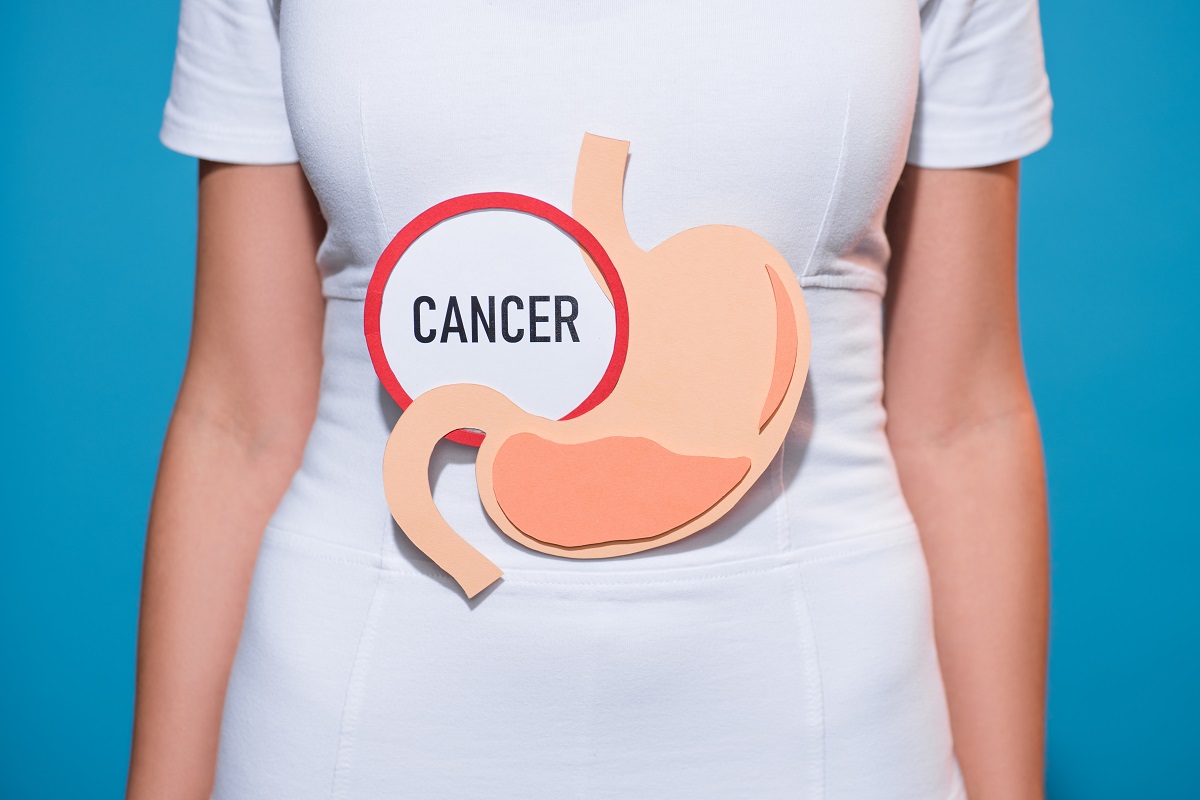This cancer type starts in the stomach cells and it is called stomach cancer or gastric cancer. The stomach helps to digest food and it is located in the upper part of the abdomen. This type of cancer can appear in any part of the stomach but mostly appears in the main part of the stomach (also known as the stomach body).
However, in the U.S. stomach cancer usually begins in the gastroesophageal junction (this is the part where the esophagus meets the stomach). The esophagus is a long tube that carries the food you swallow.
Healthcare professionals usually prescribe treatment depending on the location of the cancer, type of the cells involved, and the cancer stage. However, the most common treatment option is surgery to remove the stomach cancer. The treatment is more likely to be successful if it is only in the stomach. In other words, if cancer is detected when it is small it can be cured. Unfortunately, most stomach cancers are found in advanced stages, which reduces the chances of being cured. Furthermore, stomach cancer may spread to other body tissues and organs, especially without treatment.
Symptoms
People with stomach cancer usually experience the following symptoms. For example:
- Heartburn
- Nausea
- Vomiting
- Unusual weight loss
- Extreme tiredness (fatigue)
- Black stools
- Loss of appetite
- Feeling full even after small food amounts
- Bloating, especially after a meal
- Abdominal pain
- Difficulty swallowing
People with an early stage of stomach cancer do not always experience symptoms. However, when symptoms occur they may experience indigestion and abdominal pain. Sometimes, symptoms may not appear until an advanced stage of cancer happens. Those who experience later stages of stomach cancer may have the following symptoms. For example vomiting blood, weight loss, and extreme tiredness.
When the tumor grows too much, it may break and spread throughout the body causing other symptoms. For instance, if the cancer spreads to the lymph nodes it may cause a lump that you can feel through the skin, to the liver may cause jaundice (yellowing of the eyes and skin), and to the abdomen may lead to a fluid buildup.
If you experience any of the previous symptoms or any others that bother you, immediately visit a doctor.
Causes
Healthcare providers do not fully understand why stomach cancer happens. They suspect it may appear when something hurts the stomach lining including infections, long-standing acid reflux, or eating many salty foods. However, people with previous risk factors do not always develop stomach cancer so, more research is needed.
This cancer type commonly begins when stomach lining cells become damaged, leading to DNA changes (mutations). DNA contains instructions that tell cells when to grow, multiply, and die. In any case, a changed DNA gives different instructions to cells causing abnormal growth and multiplication. When unusual cells become too much they form a growth (tumor) in the stomach. Thus, tumors that may occur in the stomach cause damage to healthy cells. If it is not treated, the tumor may break and spread throughout the body affecting other body tissues and organs (metastasis).
Stomach Cancer Types
The stomach cancer type people experience depends on the cell where the cancer started. Check below some examples:
- Adenocarcinoma – This type of cancer begins in the cells that make mucus and it is the most common stomach cancer type.
- Gastrointestinal stromal tumors (GIST) – It starts in the nerve cells located in the stomach wall and other digestive organs. Moreover, gastrointestinal stromal tumor is a type of soft tissue sarcoma.
- Carcinoid tumors – In such cases, cancer cells begin to appear in the neuroendocrine cells. These cells are found in different places in the body.
- Lymphoma – This cancer type starts in the immune system cells. In some cases, it may begin in the stomach when the body’s immune system sends cells to the stomach. Approximately all lymphomas that begin in the stomach are a type of non-Hodgkin’s lymphoma.
Risk Factors
Anyone may develop this cancer type and the following factors may elevate your risk. Check some of them below:
- Problems with stomach acid back up to the esophagus (gastroesophageal reflux disease)
- A diet low in fresh fruits and vegetables and high in salty and smoked foods
- Infection caused by H. pylori (Helicobacter pylori)
- Irritation and swelling of the stomach (gastritis)
- Smoking
- Benign (noncancerous) cells in the stomach (polyps)
- Family history of stomach cancer or genetic syndromes linked with an increased risk of stomach cancer. These include hereditary diffuse gastric cancer, Lynch syndrome, juvenile polyposis syndrome, Peutz-Jeghers syndrome, and familial adenomatous polyposis.
How to Prevent Stomach Cancer?
Check below some tips that may reduce the risk of stomach cancer:
- Adopt a healthy diet full of fresh fruits, vegetables, and whole grains
- Limit or avoid smoking and salty foods
- Quit smoking or never start
- Inform your healthcare professional if you have a family history of stomach cancer. In such cases, doctors will recommend regular screening to detect the cancer as early as possible.
Diagnosis
Healthcare providers usually diagnose this cancer type by performing the following tests. These include:
- Upper endoscopy – This test involves a small tube with a camera that allows your doctor to see inside the stomach. It is done to check for cancer symptoms.
- Biopsy – This procedure is usually done during upper endoscopy. It involves a small sample of tissue that is sent to the laboratory for testing. Doctors perform biopsies when they see something that mimics cancer. The sample is tested in the laboratory under a microscope for cancer cells.
Stomach Cancer Stages
When the cancer is found, doctors may perform additional tests to determine if it has spread (staging the cancer). It helps to make the best treatment plan for you and determine the prognosis. Check below some tests used to determine the stage of the cancer:
- Blood tests – While these tests cannot diagnose stomach cancer, they can show other health problems caused by the cancer.
- Stomach ultrasound – This is an imaging test that uses sound waves to produce detailed images of the stomach.
- Other imaging tests – These include CT (computerized tomography) and PET (positron emission tomography) scans to get images of the stomach. Previous tests are used to determine if the cancer spreads to other body parts.
- Surgery – However, not every time imaging tests give a clear picture. In such cases, doctors may recommend surgery to see inside the body and determine if the cancer has spread to other body structures.
Information that your doctor will get after previous tests and procedures from the stage of the cancer, which are numbers from 0 to 4.
If the stage of the cancer is 0, it means the tumor is small and on the surface of the stomach only. In people with stage 1, the cancer grows into the stomach’s inner layers. In stages 2 and 3, the cancer goes deeper into the stomach wall. Stage 4 (also called end-stage) means the tumor breaks and spreads throughout the body (metastatic cancer).
How to Identify Stomach Cancer before it causes Symptoms?
People with an increased risk of stomach cancer should perform screening tests regularly. Finding the cancer when it is small elevates the chances to cure it. The most common test used to determine whether a person has stomach cancer or not is upper endoscopy but sometimes X-rays are used.
Treatment
Physicians commonly prescribe different treatments for people with this cancer type. It depends on the location, severity, and type of the cancer you experience. Check below the most common treatment options recommended by doctors for people with stomach cancer:
Surgery
The goal of this treatment option is to remove the cancer completely and in mild cases, this is the only treatment needed. In more advanced cases, doctors usually prescribe additional treatments to destroy cancer cells that may remain after surgery. Check below some types of surgeries used for people with stomach cancer:
- Endoscopic mucosal resection – This procedure involves the removal of a small cancer from the stomach lining. Sometimes, surgeons also remove a small amount of healthy tissue to ensure there are no cancer cells remaining. This is the only treatment needed for people with stage 1 cancer.
- Subtotal gastrectomy – This surgery type involves the removal of a part of the stomach that is negatively affected by the cancer. Subtotal gastrectomy is often prescribed by doctors when cancer appears near the small bowel.
- Total gastrectomy – In such cases, surgeons remove the stomach completely and some tissues around it. Thereafter, they connect the esophagus to the small intestine, which helps allow food to move through the digestive system.
Chemotherapy
This treatment involves strong medications that help destroy cancer cells throughout the body. However, there are 2 types of chemotherapy for people with stomach cancer. For example, medicines are given into a vein (intravenously), and medications are placed directly in the abdomen after surgery (the second type is also called hyperthermic intraperitoneal chemotherapy or HIPEC).
Radiation Therapy
This treatment option uses powerful energy beams to destroy cancer cells. This treatment option frequently is recommended along with chemotherapy.
Targeted Therapy
This therapy involves medications that target a specific protein in the cancer cells causing them to die. However, doctors may perform some tests before these medications to see if this treatment will be effective for you.
Immunotherapy
This treatment method involves medications that boost the immune system to destroy cancer cells. In addition, cancer cells produce a substance that helps them hide from the immune system. Immunotherapy is usually used when people have stage 4 cancer.
Frequently Asked Questions
What are the primary symptoms of stomach cancer?
- Reduced appetite
- Unusual weight loss
- Indigestion or heartburn
- Fatigue
- Nausea or vomiting (that may occur with blood)
- Abdominal discomfort or pain
If you experience any of the previous symptoms, do not hesitate to see a doctor.
Can stomach cancer be cured?
It is possible to recover completely after this cancer type if it is detected early when it is small. Otherwise, there are lower chances of curing the cancer. Discuss with your healthcare professional for more details.
What are the possible complications of stomach cancer?
Sometimes, people with gastric cancer may experience some complications, especially without treatment. These include pyloric stenosis, pyloric obstruction, ascites, and others. Ask your physician if you have any other questions.




